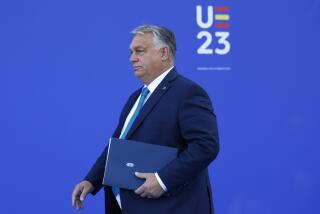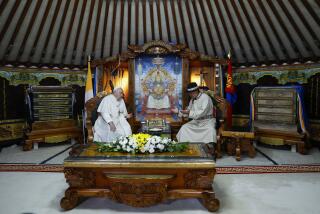Mongolia Reform Group Marches to Rock Anthem
- Share via
BEIJING — Hongk is all the rage in the Mongolian People’s Republic these days. It’s a key part of the shinechiel that has been sweeping the remote Communist nation for weeks now. And, at the heart of the movement, is Zorig, a 27-year-old professor of classical Marxism by day who rails against his Marxist leadership by night.
Strange, perhaps, but true; and, some experts add, perhaps only in Mongolia.
An isolated and little-known country between Soviet Siberia and China’s Inner Mongolia region, the once hard-core Communist Mongolian People’s Republic has quietly but decisively spawned an experiment in Soviet-style reform that is at least as strange as the words its 2 million citizens have adopted to describe it.
Hongk is the name of a rock ‘n’ roll band that one Western diplomat recently described as “Mongolia’s answer to Wham!” The two-man band, whose Mongolian name means “bell,” has been playing its powerful dissident renditions to packed audiences in the state-owned auditoriums of Mongolia’s capital of Ulan Bator for months now. Its music has become the unchallenged anthem of the city’s fledgling protest movement.
Shinechiel is the Mongolian word for perestroika, the reform policy of Soviet President Mikhail S. Gorbachev in Mongolia’s superpower neighbor to the north, which has been Mongolia’s inspiration, its paternalistic protector and its closest ally for the past seven decades.
And Fanjasuren Zorig is the bespectacled, self-styled leader of the Mongolian Democratic Union, a group of Mongolian artists and intellectuals claiming a membership of 60,000. It is using everything from Hongk’s rock music to the legendary exploits of Genghis Khan to spearhead a pro-democracy movement not quite like anything in the recent revolutions in Eastern Europe.
All that in a nation that ranks as the world’s second-oldest Communist state after the Soviet Union, and in a capital where the streets are still named Lenin Avenue and Brezhnev Street.
In fact, it was near the intersection of Marx Avenue and Peace Avenue, beneath the statue of Mongolian revolutionary leader Sukhe Bator, that the most visible part of Mongolian shinechiel played itself out in recent weeks: Sunday demonstrations that have continued despite a recent government ban.
According to diplomats and foreign visitors in Ulan Bator interviewed by The Times from Beijing, last Sunday’s pro-democracy rally was a perfect illustration of the tone of a movement that is neither militant nor officially sanctioned, but somewhere in between--the obvious product of a delicate, Mongolian-style political balance.
“This was not a fist-waving, yelling, screaming sort of thing,” said one Western diplomat who attended the demonstration. “People appeared to just want to hear what the speakers had to say. They were just there to learn.”
What they heard from Zorig and the movement’s eight other leaders were appeals echoing much of the sentiment voiced in Eastern Europe--calls for a multi-party system, for a five-day work week, for investigations into the political crimes of past dictators, for a decentralized economy and expanded private sector--and for an end to the special privileges enjoyed by the Communist Party leaders who have ruled Mongolia for the last 69 years.
“The premier and deputy premiers are responsible for the terrible state of affairs,” Zorig declared from the podium at one point in his Sunday speech. And later, he commended the crowd as “a truly democratic” group that had come “not because you were forced, but because you wanted to come.”
Subzero Rally
Going to Sukhe Bator Square was, in itself, no easy task. Temperatures in the capital Sunday ranged between 26 and 30 degrees below zero. But witnesses said the audience stood in their fur caps, felt boots and thick Mongolian sheepskin-lined tunics for more than two hours. And some of them, gloveless, carried banners bearing such slogans as, “Speed up perestroika. “
Despite the government ban on demonstrations in the square, which was announced just two days before Sunday’s protest, there were no uniformed police visible, there were no arrests and the government made no attempt to disperse the crowd. Instead, the party publicly announced that several internal reforms would be forthcoming, and the state radio said the party would give up such privileges as a special hospital, rest home and store.
The party also promised elections for local party posts this year, the East German news agency ADN reported from Ulan Bator.
“What we saw was hardly the start of a revolution,” the Western diplomat said. “It is more the beginning of a process that might become regularized somehow. You just don’t get the feeling that the central government or the party are trying to stop it; in fact, just the opposite.”
It was, after all, the official, Communist Party-run Mongolian tourist bureau that set up a press conference with dissident leader Zorig for several visiting foreign journalists immediately after the Sunday protest, at which he declared emphatically: “We think we will have a democratic government within this year.”
Indeed, the Politburo of the ruling Mongolian People’s Revolutionary Party has been more than tolerant of Zorig’s movement. The nation’s 63-year-old president and ruling party leader, Jambyn Batmonh, has cast himself as a reformer and publicly said he is following Gorbachev’s lead. And although his 90,000-strong ruling party is the only legal party in Mongolia, Batmonh’s aides have indicated that a multi-party system may well be in the offing.
“The constitution does not prohibit opposition parties,” declared Terbish Chimeddorg, spokesman for Mongolia’s Foreign Ministry, during a press briefing for foreign reporters visiting Ulan Bator last week. “The party considers it possible to have the multi-party system in the country.”
Mongolia-watchers in Beijing said that statement was a strong indicator that the democracy movement is rooted more in nationalism than in dissent.
“Watching it unfold, you get the feeling this is more a pro-nationalist and pro-Mongolian movement than it is anti-party or anti-government,” said a diplomat who left Ulan Bator on Monday. “For example, during the rally, we saw Mongolian national flags that included all but one of the standard symbols. The sun, the moon, the Buddhist yin-yang circle and the three-pronged flame depicting the past, present and future were there, but the five-pointed star of communism, which is part of the official flag, was missing.”
There is another, far more dramatic example of the movement’s nationalist roots: Genghis Khan.
For decades after the Communists took control of Mongolia from China in 1921 and renamed its capital Ulan Bator, or “Red Hero,” the name of the nation’s ruthless and brilliant founding father was unmentionable--wiped out of history books. That revisionism was part of a Soviet-sponsored purge that left untold thousands of Mongolian warriors, hunters and Buddhist priests dead or imprisoned.
Only today is “the Great Khan,” as spokesman Chimeddorg called him this week, being rehabilitated.
The nation’s youth--the majority of Mongolians are under the age of 25--are learning for the first time the exploits of a man known variously as “The Perfect Warrior,” “The Mighty Manslayer” and “The Scourge of God” during the 13th Century, when he united Mongolia’s fractious clans and khans and conquered nearly half of the known world by building what many military historians consider the fiercest army in history.
Mongolia’s Hero
Despite Chimeddorg’s praise, the ruling party is proceeding slowly in rehabilitating the memory of Genghis Khan. After noting that he deserves credit for unifying the first Mongol state, the government spokesman added that it cannot be forgotten that Genghis Khan had, indeed, “killed many people.”
Zorig, though, was anything but oblique in describing the legend that has become a symbolic centerpiece of his movement.
“For us, Genghis Khan was an outstanding man,” he declared.
And, in what is perhaps graphic proof that most of Zorig’s countrymen agree, Western diplomats noted that the hottest song in Ulan Bator today is a rock ‘n’ roll number entitled “Genghis Khan.”
“Rock music, you see, is the medium of the movement, and it’s very much open and very much sanctioned in Mongolia now,” said the diplomat who recently visited Mongolia. “And it’s clearly the mode of expression of choice of the young people; everyone under 25, it seems, is studying electric guitar.
“It’s really no different than it was in the ‘60s in the U.S. or even in the ‘80s in Moscow, which is where the Mongolians still look for inspiration. Rock ‘n’ roll is an expression of discontent, and it’s the most powerful way to make a peaceful statement for political change.”
The diplomat added that neither the medium nor the tone of that statement is likely to change in Ulan Bator in the near future.
“This simply is not going to turn violent.” he said, “Neither myself nor anyone else I’ve spoken to there thinks Ulan Bator is going to explode within the next month or two.
“For one thing, it’s just too damn cold in Mongolia.”
More to Read
Sign up for Essential California
The most important California stories and recommendations in your inbox every morning.
You may occasionally receive promotional content from the Los Angeles Times.













